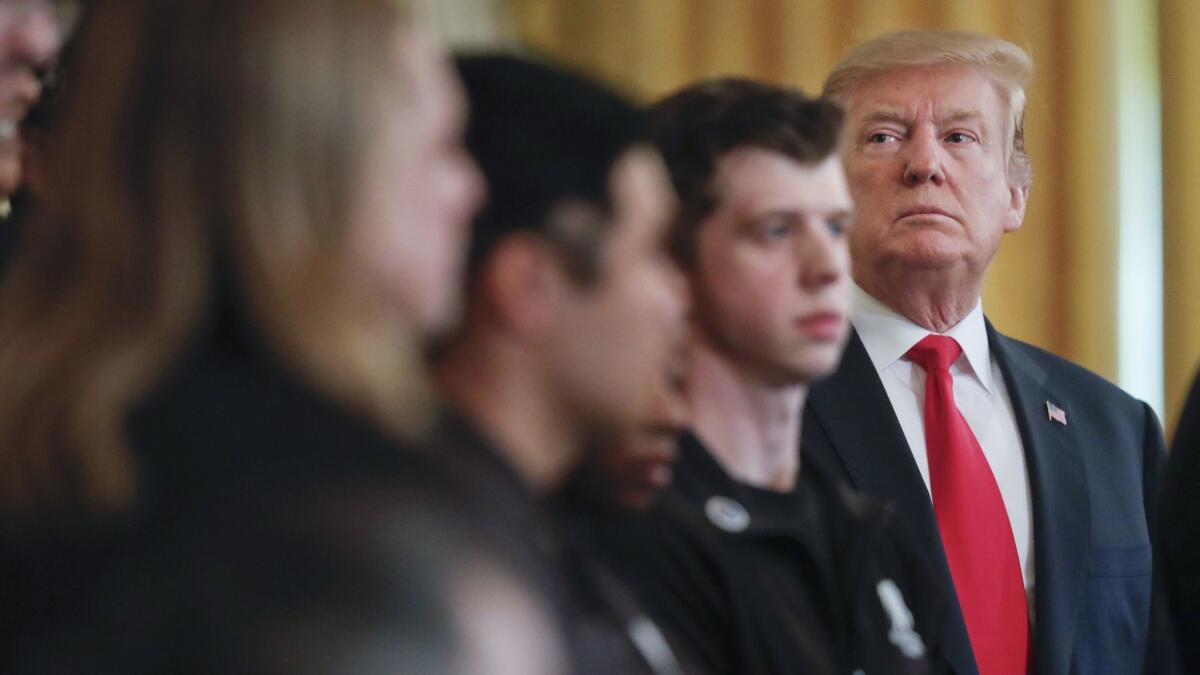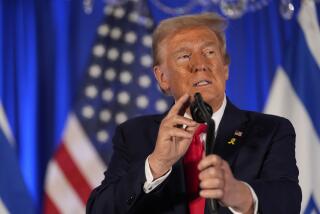Mueller finds no conspiracy, but report shows Trump welcomed Russian help

Reporting from Washington — Shortly before he released the special counsel’s redacted report on Thursday, Atty. Gen. William Barr announced the document said President Trump’s campaign had not “conspired or coordinated with the Russian government in its election interference activities.”
But Barr omitted the first part of that sentence from Robert S. Mueller III’s report. The special counsel wrote that Trump’s campaign “expected it would benefit electorally from information stolen and released through Russian efforts.”
The gap between Barr’s rosy interpretation and Mueller’s evidence was another example of how far the attorney general has stretched to portray the president in the best possible light at the end of an investigation that cast a dark shadow over the White House for the last two years.
It also was a pointed reminder of Trump’s willingness to seek any advantage against Hillary Clinton, even if help came from a hostile foreign government conducting an illegal intelligence operation on American soil.
Indeed, the first page of the report described Moscow’s efforts to help Trump and undermine Clinton as “sweeping and systemic,” undermining Trump’s repeated claims that Russia had nothing to do with his unexpected White House victory.
In the end, no Americans were charged with conspiring with Russian efforts to interfere with the election. But the report portrays a presidential campaign that had a symbiotic, if not criminal, relationship with Moscow’s tampering.
The Trump campaign focused on WikiLeaks’ disclosures of Democratic Party emails hacked by Russian military intelligence officers, hoping to capitalize on embarrassing revelations from purloined messages. And they amplified disinformation blasted out by the Internet Research Agency, a troll factory in St. Petersburg that infected social media with inflammatory messages.
The 448-page report is out. More than a third of the pages have at least one redacted word »
At one point, Russian operatives helped organize a political rally with unwitting voters in Florida. After it was over, Trump’s Facebook page shared photos from the event with the message, “THANK YOU for your support Miami!” The Russians then forwarded Trump’s praise to other conservative activists.
The Russians even took their cues directly from Trump at one point, according to the 448-page document.
On July 27, 2016, Trump told a news conference he wanted Moscow to find emails from Clinton’s private server. “Russia, if you’re listening, I hope you’re able to find the 30,000 emails that are missing,” he said.
In written answers to questions from the special counsel’s office, Trump denied that he had urged Moscow to hack U.S. computers. The statement, he said, was made “in jest and sarcastically, as was apparent to any objective observer.”
Mueller made clear that the Kremlin-backed team didn’t catch the supposed joke.
“Within approximately five hours of Trump’s statement,” the report said, Russian military intelligence tried to hack Clinton’s personal office for the first time.
Trump also told prosecutors that he didn’t remember warnings that Russia was boosting his candidacy, even though the politically sensitive issue was the topic of widespread reporting.
“I have no recollection of being told during the campaign that Vladimir Putin or the Russian government ‘supported’ my candidacy or ‘opposed’ the candidacy of Hillary Clinton. However, I was aware of some reports indicating that President Putin had made complimentary statements about me,” the president wrote.
The answer meshes with Trump’s string of deflections and denials about Russia’s influence during the campaign out of fears that the issue undermined the legitimacy of his presidency.
Last summer, Trump stunned his own national security team when he publicly sided with Russian President Putin over U.S. intelligence agencies during a summit between the two leaders in Helsinki, Finland.
“He just said it’s not Russia,” Trump said. “I will say this, I don’t see any reason why it would be.” Under intense pressure, Trump later said he had misspoke.
During the campaign, Trump sought lucrative business opportunities in Russia at the same time he was proposing closer ties with a traditional U.S. adversary. Michael Cohen, his lawyer, later admitted to lying to Congress about then-secret negotiations to build a Trump Tower in Moscow. The project ultimately was shelved.
It was another example of how Trump and Russia were intertwined, but Mueller did not see it as part of a criminal conspiracy involving the election.
Cohen, the report said, “did not recall candidate Trump or anyone affiliated with the Trump Campaign discussing the political implications of the Trump Moscow project with him.”
Trump was simply seeing dollar signs while running for office, according to the report. Cohen recalled that Trump said the campaign would be an “infomercial” for Trump properties, the report said.
On Thursday, as Mueller’s report was being released, Trump said the investigation showed there was “no collusion” and “no obstruction.” His comments reflected none of the anxiety about Moscow’s role that Barr had expressed hours earlier.
“I am sure that all Americans share my concern about the efforts of the Russian government to interfere in our election,” the attorney general said.
Many of the report’s details on how the Trump campaign handled WikiLeaks are redacted, possibly because they overlap with the ongoing prosecution of Roger Stone, a longtime political advisor to Trump. Stone is scheduled to stand trial later this year on charges of lying to Congress about his conversations involving WikiLeaks. He has pleaded not guilty.
Among the redactions are Trump’s comments to Cohen after WikiLeaks dumped its first round of emails shortly before the 2016 Democratic National Convention.
But other new details are revealed. Richard Gates, the deputy campaign chairman, told investigators that officials planned “a press strategy, a communications campaign, and messaging based on the possible release of Clinton emails by WikiLeaks,” according to the report.
At another point, Paul Manafort, the campaign chairman, “expressed excitement” about WikiLeaks.
Manafort has been sentenced to 7½ years in prison for financial crimes and conspiracy charges related to his work as a political consultant in Ukraine. Gates has pleaded guilty in a related case, and he’s cooperating with investigators as he awaits sentencing.
WikiLeaks also communicated directly with Donald Trump Jr., the president’s eldest son, using Twitter direct messages.
At one point, he asked WikiLeaks for information about its upcoming release of hacked files, which turned out to be emails stolen from John Podesta, Clinton’s campaign manager. WikiLeaks did not respond.
Once the organization began posting Podesta’s emails, WikiLeaks messaged Trump Jr. again to suggest his father share a link to their content. Two days later Trump Jr. tweeted the link to his followers.
Throughout the campaign, Trump and his associates denied having contacts or business in Russia. The investigation, however, “identified numerous links between individuals with ties to the Russian government and individuals associated with the Trump Campaign.”
Some of those contacts resulted in criminal charges. For example, Michael Flynn, Trump’s first national security advisor, pleaded guilty to lying about his conversations with the Russian ambassador during the presidential transition.
But many of them did not add up to crimes, Mueller determined. For example, top campaign officials met with a Russian lawyer in June 2016 at Trump Tower after Trump Jr. was told she was a Kremlin emissary who had damaging information on Clinton.
Mueller’s team considered charging Trump Jr. and other campaign officials with violating campaign finance laws in connection with that meeting.
Before the meeting, Trump Jr. was told the lawyer, Natalia Veselnitskaya, had political dirt on Clinton and represented the Kremlin’s support for his father. Trump Jr. responded, “If it’s what you say, I love it.”
“There are reasonable arguments that the offered information would constitute a ‘thing of value,’” the report said.
But prosecutors decided not to bring charges because they could not prove Trump Jr. and others intended to violate the law in agreeing to the meeting.
Mueller’s lawyers also doubted they could prove the information was valuable enough to convince a jury to convict them, the report said. In the end, Veselnitskaya spent much of the meeting lobbying the Trump campaign officials to support lifting the Magnitsky Act, a 2012 U.S. law that freezes assets of Russian officials responsible for human rights abuses.
Times staff writers David S. Cloud and Evan Halper contributed to this report.
More to Read
Get the L.A. Times Politics newsletter
Deeply reported insights into legislation, politics and policy from Sacramento, Washington and beyond. In your inbox three times per week.
You may occasionally receive promotional content from the Los Angeles Times.











